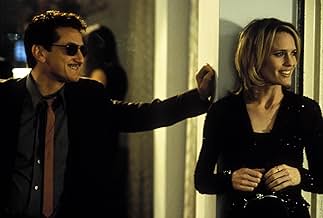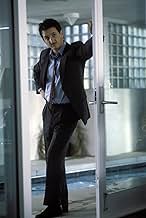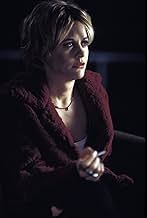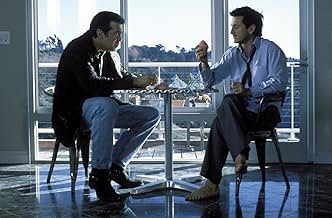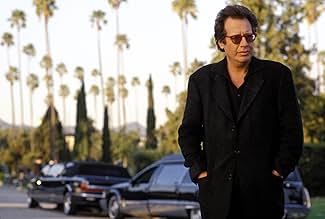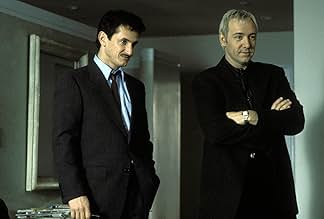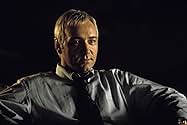Hollywood movers and shakers dissect their own personal lives when everything seems to clash together.Hollywood movers and shakers dissect their own personal lives when everything seems to clash together.Hollywood movers and shakers dissect their own personal lives when everything seems to clash together.
- Awards
- 1 win & 3 nominations total
- Darlene
- (as Robin Wright Penn)
- Susie
- (as Gianna Renaudo)
- TV Anchor
- (as Elaine Corral)
Storyline
Did you know
- TriviaKevin Spacey asked the director for call sheets when Garry Shandling was going to be doing his scenes so that he could be there to watch. Spacey gave Shandling acting advice between takes, and at one point was even Garry's focal point behind the camera to mimic a facial expression, which the director used in the film since it captured the moment perfectly.
- GoofsWhen Eddie lies under the glass table while Mickey and Artie talk to him, the location (and amount) of cocaine changes between shots.
- Quotes
Mickey: You don't know what you're saying. You don't.
Eddie: I do.
Mickey: No. I know you think you know what you're saying, but you're not saying it.
Eddie: No, I know what I'm saying. I don't know what I mean, but I know what I'm saying. Is that what you mean?
Mickey: Yeah.
Eddie: Right. But it's not like anybody knows what anything means, right? It's not like anybody knows that. So at least I know I don't know what I mean, which is better than most people. They probably think they know what they mean, not just what they think they mean.
- SoundtracksThere Goes the Neighborhood
Written by Sheryl Crow, Jeff Trott
Performed by Sheryl Crow, with Sheryl Crow (clarinet/percussion), Gregg Williams (drums/programming/percussion),
Jeff Trott (guitars), Tim Smith (bass), Bobby Keys (baritone/tenor/alto sax), Michael Davis (trombone),
, Kent Smith (trumpet)
Perhaps the intention in David Rabe's script, and certainly I could see it being that for the stage where it was originally done, is that they're in a nihilistic circle of their own making, filled with drug- laden anecdotes and partying and screwing around and all that stuff that Hollywood people "do" (and hey, it's the world by Mulholland drive so it's that kind of terrain), and they're just trying to get by each their own way. But it's how characters speak that becomes uneven. Sean Penn's Eddie is a paranoid mess who is fine for a few minutes when we see him clean and sober, and then right back to being a dick as soon as he's back on the powder. Kevin Spacey's Nicky seems more cool-headed and rational, but is so vindictive that, perhaps comparatively, comes off best but among the real world still fails at humanity (maybe by default). And Phil, that's a whole other ball of wax, a man so neurotic he makes Woody Allen characters look like the Beaver Cleavers.
The women are a little more of a mixed lot, with Darlene (Robin Wright Penn, not too oddly enough Sean's wife) the most sane and clear-headed and rational. It's mostly in Hurlyburly a question of being so thick into the muck of decay that it just becomes self-indulgent. And the way characters speak tends to go on and on, mostly with a guy like Phil who just has too many words up his sleeve for someone who should have more of an instinctual, guttural way of talking like a primitive beast. It's not the talk of movie people but theater, and that's one of the big slip ups here, and not an uncommon one with adaptations which is to not have the right tone for the screen. Sometimes the dialog can be agreeable, maybe close to funny (the scene where Phil throws Meg Ryan's character out of the car, and what leads up to it, is amazing). But too much of it is over-loaded with language.
The acting should be what saves it. Sometimes it does. I mean, look who is over here after all, Oscar winners and other notables. But when Garry Shandling ends up really taking the acting prize (and most notably with a scene where he talks with Penn through a glass table) you know there's something not quite right. Spacey is fine but he could do this part in his sleep; more curious would've been to see Christopher Walken, who originated the role on Broadway, in the role as it would've been so unusual for him. Penn has his moments where he connects emotionally, but the rest of it is in such predictable ham-bone mode that it becomes laughable; most excruciating is a scene where he keeps begging Meg Ryan for a BJ, and it gets to a point where Tommy Wiseau would be needed as a dramatic stand-in. You're tearing me apart, movie!
Palminteri seems the most mis-cast though; I never really believed much of what he was saying, and only once or twice did it look like he was even slightly well-off in the role. He keeps on making these things with how he speaks (though it might be akin to how Phil talks) and it's just odd and embarrassing, considering that the man can act in the right role, usually in urban street-wise stuff. A neurotic is not for him, and he has to play one to such a psychotic extent and looks a little dumbfounded in some scenes why he's even there! And it's not all on the director's fault, at least, maybe, I wouldn't think so entirely. He does keep some scenes moving along to try and bring some cinematic quality to it. But when it stalls into its theater-setting, it shows.
I don't want to be too hard on the movie, and yet it's tough when there's such high stakes: a dynamite cast, a drug-fueled set-up that allows for so much potential drama. The results should be fantastic. And instead it's the kind of hot-headed pretentious bally-hoo that makes people hate Hollywood people: they're heads are so far up their asses they don't know where the sun shines anymore.
- Quinoa1984
- Jan 31, 2011
- Permalink
- How long is Hurlyburly?Powered by Alexa
Details
Box office
- Budget
- $15,000,000 (estimated)
- Gross US & Canada
- $1,798,862
- Opening weekend US & Canada
- $164,826
- Dec 27, 1998
- Gross worldwide
- $1,808,004
- Runtime2 hours 2 minutes
- Color
- Sound mix
- Aspect ratio
- 1.85 : 1
Contribute to this page



